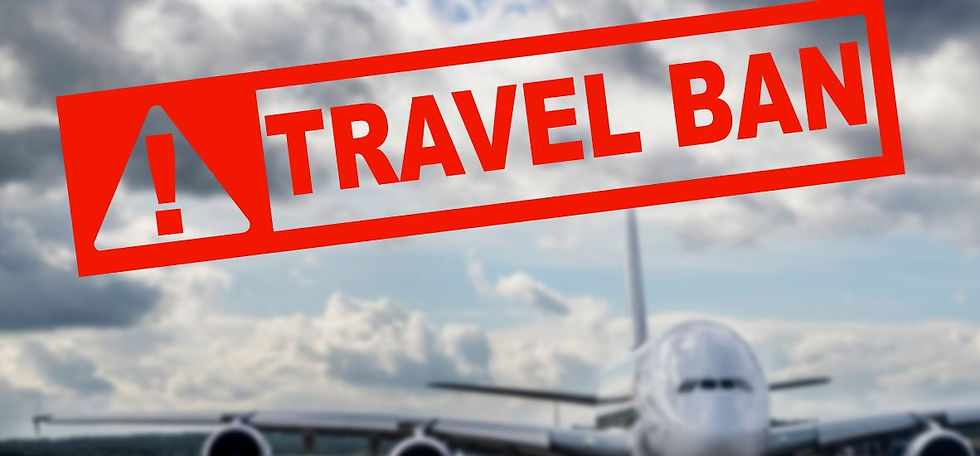CREWMEMBER VISA
- Patricia Elizee

- Apr 18, 2023
- 4 min read
Updated: Apr 28, 2023

A foreign national wishing to enter the United States must first obtain either a nonimmigrant visa for temporary stay or an immigrant visa for permanent residence. Crewmember (D) visas are nonimmigrant visas for individuals working onboard commercial sea vessels or international aircraft in the United States, providing services essential for normal operation, and intending to depart the United States within 29 days on the same vessel or any other vessel. In addition to a crewmember (D) visa, you need a transit (C-1) visa or a combination C-1/D visa if you are traveling to the United States to join the vessel you will work on.
Transit (C) visa are nonimmigrant visas for individuals traveling through the United States in immediate and continuous transit en route to another country. Immediate and continuous transit is defined as a reasonably expeditious departure of the traveler in the normal course of travel as the elements permit and assumes a prearranged itinerary without any unreasonable layover privileges.
C1/D transit/crewmember visa is a combination of two visas for those who have to board a ship or an airplane as crew members for normal operations and services, and also require transiting the U.S. to get to the ship or the aircraft they will join. The consular section will issue a combined C1/D visa if the reciprocal program of the applicant’s country of nationality allows. This visa only permits temporary stays in the United States as part of your employment on board. With a C-1/D visa, a maximum stay in the United States of up to 180 days per entry is permitted; either several times or in a single block. The exception to this rule is crew members of ships. They have to leave the United States with their ship after 29 days at the latest.
Examples of travel purposes which require Crewmember (D) Visas
Pilot or flight attendant on a commercial airplane
Captain, engineer, or deckhand on a sea vessel
Lifeguard, cook, waiter, beautician, or other service staff on a cruise ship
Trainee on board a training vessel
You do not qualify for a Crewmember Visa if:
Dry Dock: The primary services you will perform are dry dock repairs under warranty while the boat is docked at a U.S. port.
Fishing Vessel: You are a crewmember on a temporary basis on a fishing vessel that has a home port or operating base in the United States.
Coasting Officer: You are a replacement coasting officer employed when an officer of a foreign vessel is granted home leave, and the vessel does not remain in U.S. waters for more than 29 days.
Private yacht: You are a crewmember on a private yacht sailing out of a foreign port which will be cruising in U.S. waters for more than 29 days.
Outer Continental Shelf: You are a crewmember going to the Outer Continental Shelf.
Under certain conditions, B-1 visas can be obtained by individuals who are not employed as crew members. This includes crew members who are in charge of dry dock maintenance and can present a work agreement for this activity. A B-1 visa is also required for anyone who works on a private yacht and sails or cruises in American waters for more than 29 days.
To apply for a transit or crew member visa, you must submit the following:
A Nonimmigrant Visa Electronic Application (DS-160) Form.
A passport valid for travel to the United States with a validity date at least six months beyond your intended period of stay in the United States (unless country-specific agreements provide exemptions). If more than one person is included in your passport, each person desiring a visa must submit an application.
Photo – You will upload your photo while completing the online Form DS-160. One (1) 2"x2" (5cmx5cm) photograph.
A receipt showing payment of your non-refundable nonimmigrant visa application processing fee, paid in local currency.
If applicable, a seaman's book valid beyond the expiration date of your employment contract and all prior seamen's books. Crew members must submit an official report of loss if they are unable to submit the book.
Required Documents
A consular officer will consider many factors during your interview, including supporting documents. Consular officers look at each application individually and consider professional, social, cultural and other factors during adjudication. They may look at your specific intentions, family situation, and your long-range plans and prospects within your country of residence. Each case is examined individually and is accorded every consideration under the law.
Do not present false documents. Fraud or misrepresentation can result in permanent visa ineligibility. If confidentiality is a concern, you should bring your documents to the Embassy in a sealed envelope. The Embassy will not make your information available to anyone and will respect the confidentiality of your information.
You should bring the following documents to your interview:
Current proof of income, tax payments, property or business ownership, or assets.
A letter from your employer detailing your position, salary, how long you have been employed, any authorized vacation and the business purpose, if any, of your U.S. trip.
Where appropriate, an itinerary and/or other information about your planned trip. (This can be tentative.)
Bank savings account books or other evidence of liquid assets that indicate the balance in your accounts and account activity.
Real estate lease or deeds.
For crew: a letter from your company's headquarters and/or your seamen's book
A consular officer will interview you to determine whether you are qualified to receive a crewmember visa, and if so, which visa category is appropriate based on your purpose of travel. You must establish that you meet the requirements under US law for the visa category for which you are applying. About one week after the successful interview at the U.S. consulate, the passport including the C-1/D visa will be sent to the employee by mail. If the visa is denied, your passport will be returned to you at the conclusion of the interview, along with a letter explaining the reasons for the visa refusal.
Hiring an experienced immigration attorney to handle the process can help minimize the risk of delays and provide peace of mind. For more information on how we can assist you, please visit our website at www.elizeelawfirm.com or email us at intro@elizeelawfirm.com.
Patricia Elizee is the managing partner of the Elizee Law Firm, an immigration law firm located at 1110 Brickell Avenue, Suite 315, Miami, Florida 33131. Phone 305-371-8846


















Comments